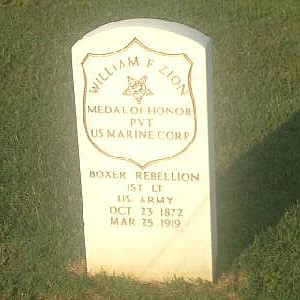Of the seven Medal of Honor recipients buried in the Chattanooga National Cemetery, one was honored for actions in a skirmish given short shrift in American history books - if, indeed, it is mentioned at all.
William F. Zion was honored for his "meritorious conduct" during what is now called the China Relief Expedition (previously known as the Boxer Rebellion).
Today, as tiny flags mark every grave in the cemetery, including the former Marine private's tombstone in Section U, just above and to the left of the main entrance off Holtzclaw Avenue, the country at least symbolically pauses to remember those who served in the military service of the country.
If we're the least bit thoughtful, we should utter a prayer of thanks for those who fought to keep the country free. We're not a perfect nation, but for more than two centuries we have been the world's brightest beacon of liberty, a stanchion of hope and a land of opportunity.
Zion reportedly was in the Chattanooga area only because he was stationed at Fort Oglethorpe, then an Army base. Indeed, he was born in Knightstown, Ind., and joined the Marines while living in California. But he was here when he sustained a fatal accidental gunshot wound while cleaning his weapon, and it is here that his remains have stayed.
Zion appears to have made the military his career. He was a member of the U.S. Marine Corps, where he was a private, from 1899 to 1904 and a member of the U.S. Army, where he earned the rank of first lieutenant, from 1905 to his death in 1919.
He served at least some time in the Philippines when the islands were a U.S. territory in the early 1900s, and during World War I at Fort Oglethorpe he was in charge of a German prisoners-of-war barracks.
Zion, who was Jewish according the book "The Jewish Legion of Valor," holds several distinctions. He was the only Jewish member of the United States military to be given the Medal of Honor during the China Relief Expedition, was the first Marine Medal of Honor winner to later join the Army, and is the only Jewish Medal of Honor recipient buried in the local national cemetery.
Little is known about Zion's particular service during the China conflict. Indeed, his citation says only that his Medal of Honor was given for his actions "in the presence of the enemy during the battle of Peking, China, 21 July to 17 August 1900. Throughout this period, Zion distinguished himself by meritorious conduct."
But the Marine private was among 2,000 American troops who were sent to China in early summer 1900 to help quell an uprising by members of a grassroots movement of peasants, nicknamed Boxers for their martial arts prowess, who were threatening the foreign missionaries in the country and the Western powers who were attempting to widen business markets there.
Then-U.S. President William McKinley was reluctant to involve the country, according to Scott Miller, author of "The President and the Assassin," because the uprising threatened to destroy the president's Open Door policy, which was the U.S. insistence that tariffs throughout the country be uniform for all traders and that its ports be made open to all.
Eventually, to secure a seat at the post-skirmish conference table with other Western powers, he sent in troops to help liberate the capital of Peking (now Beijing), which Boxer and Chinese troops had besieged since June 20.
"Scaling the 30-foot stone walls that surrounded Peking, American troops were among the first to enter the capital ," Miller writes of the events of mid-August 1900. "Still to reach the foreign compound, they faced a bloody house-to-house battle through a warren of winding, unfamiliar streets. Behind every cart, in every window, atop every roof, a Boxer waited with a well-aimed shot, until the Marines wheeled in powerful cannons that easily reduced the flimsy structures protecting the Boxers to tangles of shattered masonry and splinters. By afternoon, the troops had secured the foreign compound "
Zion's Medal of Honor was issued on July 19, 2001, less than two months before McKinley was fatally wounded at the Pan-American Exposition in Buffalo, N.Y. He was one of ten Marine privates and one Marine drummer honored for their service in the China Relief Expedition.
Only briefly an area resident, he nevertheless shares space in the beautiful, scenic national cemetery with many lifelong Chattanoogans and others who were glad to call the city home. For his and for their service, a grateful nation says thank you.
